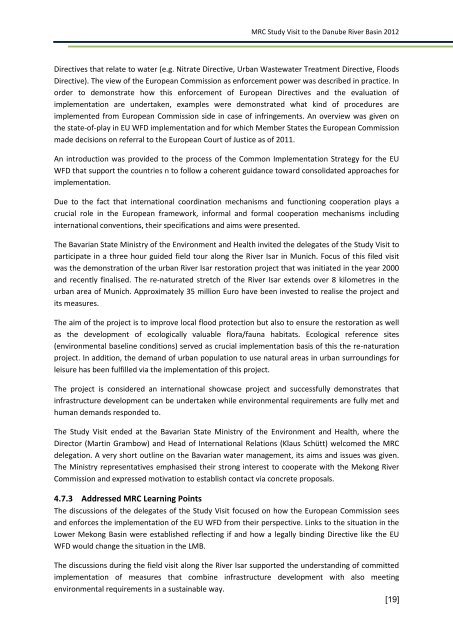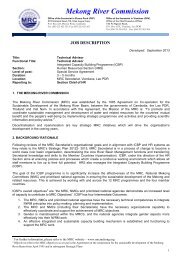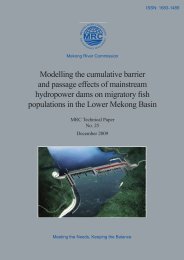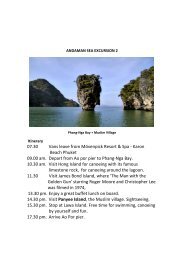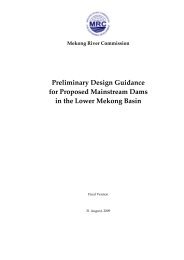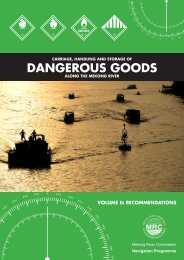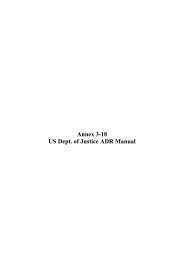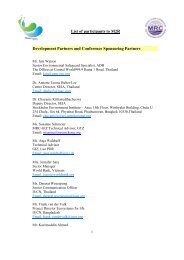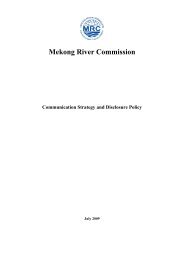evaluation of the study visit - Mekong River Commission
evaluation of the study visit - Mekong River Commission
evaluation of the study visit - Mekong River Commission
Create successful ePaper yourself
Turn your PDF publications into a flip-book with our unique Google optimized e-Paper software.
MRC Study Visit to <strong>the</strong> Danube <strong>River</strong> Basin 2012<br />
Directives that relate to water (e.g. Nitrate Directive, Urban Wastewater Treatment Directive, Floods<br />
Directive). The view <strong>of</strong> <strong>the</strong> European <strong>Commission</strong> as enforcement power was described in practice. In<br />
order to demonstrate how this enforcement <strong>of</strong> European Directives and <strong>the</strong> <strong>evaluation</strong> <strong>of</strong><br />
implementation are undertaken, examples were demonstrated what kind <strong>of</strong> procedures are<br />
implemented from European <strong>Commission</strong> side in case <strong>of</strong> infringements. An overview was given on<br />
<strong>the</strong> state-<strong>of</strong>-play in EU WFD implementation and for which Member States <strong>the</strong> European <strong>Commission</strong><br />
made decisions on referral to <strong>the</strong> European Court <strong>of</strong> Justice as <strong>of</strong> 2011.<br />
An introduction was provided to <strong>the</strong> process <strong>of</strong> <strong>the</strong> Common Implementation Strategy for <strong>the</strong> EU<br />
WFD that support <strong>the</strong> countries n to follow a coherent guidance toward consolidated approaches for<br />
implementation.<br />
Due to <strong>the</strong> fact that international coordination mechanisms and functioning cooperation plays a<br />
crucial role in <strong>the</strong> European framework, informal and formal cooperation mechanisms including<br />
international conventions, <strong>the</strong>ir specifications and aims were presented.<br />
The Bavarian State Ministry <strong>of</strong> <strong>the</strong> Environment and Health invited <strong>the</strong> delegates <strong>of</strong> <strong>the</strong> Study Visit to<br />
participate in a three hour guided field tour along <strong>the</strong> <strong>River</strong> Isar in Munich. Focus <strong>of</strong> this filed <strong>visit</strong><br />
was <strong>the</strong> demonstration <strong>of</strong> <strong>the</strong> urban <strong>River</strong> Isar restoration project that was initiated in <strong>the</strong> year 2000<br />
and recently finalised. The re-naturated stretch <strong>of</strong> <strong>the</strong> <strong>River</strong> Isar extends over 8 kilometres in <strong>the</strong><br />
urban area <strong>of</strong> Munich. Approximately 35 million Euro have been invested to realise <strong>the</strong> project and<br />
its measures.<br />
The aim <strong>of</strong> <strong>the</strong> project is to improve local flood protection but also to ensure <strong>the</strong> restoration as well<br />
as <strong>the</strong> development <strong>of</strong> ecologically valuable flora/fauna habitats. Ecological reference sites<br />
(environmental baseline conditions) served as crucial implementation basis <strong>of</strong> this <strong>the</strong> re-naturation<br />
project. In addition, <strong>the</strong> demand <strong>of</strong> urban population to use natural areas in urban surroundings for<br />
leisure has been fulfilled via <strong>the</strong> implementation <strong>of</strong> this project.<br />
The project is considered an international showcase project and successfully demonstrates that<br />
infrastructure development can be undertaken while environmental requirements are fully met and<br />
human demands responded to.<br />
The Study Visit ended at <strong>the</strong> Bavarian State Ministry <strong>of</strong> <strong>the</strong> Environment and Health, where <strong>the</strong><br />
Director (Martin Grambow) and Head <strong>of</strong> International Relations (Klaus Schütt) welcomed <strong>the</strong> MRC<br />
delegation. A very short outline on <strong>the</strong> Bavarian water management, its aims and issues was given.<br />
The Ministry representatives emphasised <strong>the</strong>ir strong interest to cooperate with <strong>the</strong> <strong>Mekong</strong> <strong>River</strong><br />
<strong>Commission</strong> and expressed motivation to establish contact via concrete proposals.<br />
4.7.3 Addressed MRC Learning Points<br />
The discussions <strong>of</strong> <strong>the</strong> delegates <strong>of</strong> <strong>the</strong> Study Visit focused on how <strong>the</strong> European <strong>Commission</strong> sees<br />
and enforces <strong>the</strong> implementation <strong>of</strong> <strong>the</strong> EU WFD from <strong>the</strong>ir perspective. Links to <strong>the</strong> situation in <strong>the</strong><br />
Lower <strong>Mekong</strong> Basin were established reflecting if and how a legally binding Directive like <strong>the</strong> EU<br />
WFD would change <strong>the</strong> situation in <strong>the</strong> LMB.<br />
The discussions during <strong>the</strong> field <strong>visit</strong> along <strong>the</strong> <strong>River</strong> Isar supported <strong>the</strong> understanding <strong>of</strong> committed<br />
implementation <strong>of</strong> measures that combine infrastructure development with also meeting<br />
environmental requirements in a sustainable way.<br />
[19]


